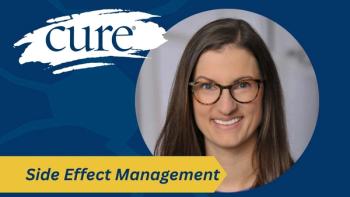
Financial Burden of Pediatric Cancer Can Cause ‘Trauma’ and Other Long-Term Effects in Survivors
Experts urge parents to continue to have conversations with their children about the financial hardships that may occur because of a pediatric cancer diagnosis.
A pediatric cancer diagnosis can quickly create anxiety and stress for parents dealing with the financial hardships that come along with it, and these feelings can easily carry over to the child, according to recent study results.
Those feelings of early stress and anxiety, according to previous data, can affect the child’s psychological well-being later in life.
In a study published in Wiley,researchers evaluated questionnaires from 417 parents (mostly female, non-Hispanic, married with a college degree and a household income of $60,000 or more) who had a child with cancer. The questionnaires were aimed at assessing the parent’s perception on if the child had sensed the financial burden of their diagnosis. The children in discussion were mostly males, with a median age of 13 at diagnosis and 14.5 at survey.
About 55.9% of parents responded “not at all” when asked if their child sensed financial problems, 44.1% said at least some, 17.7% said a little, 14.7% said somewhat, 5.3% said quite a bit and 6.4% said very much.
The researchers noted that many parents who responded “not at all” had children who were aged one through four. The researchers received responses from parents who took part in the survey. One of the parents said: “(He) was almost two when he was diagnosed and almost three when he passed, so he was not aware of the financial woes, but the older children were very aware.”
Those who replied “not at all” compared to those who replied at least some were more likely to have graduate degrees (71.4% vs. 28.6%) and income over $100,000 (68% vs. 32%).
Parents perceived that children who were aged 12 years or older at diagnosis or survey were more likely to sense the financial problems.
Factors to Finding Out
The researchers identified three context themes that influenced the child’s perception of financial problems, the first being social norms. This included the parent’s attitudes, beliefs and motivations regarding discussing family finances with children.
In an interview with CURE®, Dr. Grace Hubbard, lead faculty for the psychiatric practitioner program at the University of North Carolina, mentioned that parents can think they are protecting their children by not directly talking to them about these issues, but explained that this approach is wrong. She added that having a direct conversation can be empowering for the child.
The second theme researchers observed was conversations between adults, meaning children overhear their parents talking about the finances to other adults. In an interview with CURE®, Sheila Santacroce, lead author on this study and professor at University of North Carolina Chapel Hill School of Nursing and a longtime pediatric oncology nurse, offered advice to parents. She explained that if adults are having these conversations in front of their child and they do not want them to overhear, then take charge, step in and ask to talk privately or at another time and to set limits on what their health care team can talk about in front of the child.
One parent said, “Unfortunately, she might have overheard me discussing the cost of her prescriptions and copays. It was a very stressful time.”
Of note, this theme could be associated to the time and place of these conversations. Out of 131 parents who answered the question, “Where did the conversation (about likely financial costs) take place,” 57 said a child’s bedside, 52 said a private office, 12 said exam room and 10 said waiting room. Out of 133 parents who responded to “Was your child present during conversations about financial costs,” 57 said no, 20 said maybe and 56 said yes.
“In pediatric oncology the children are very ill, and the parents really want to be with their child at their bedside. So, there’s a lot of conversations that have happened in the child’s presence … because of not wanting to separate mom and dad from the child, that maybe the child should not care, which is a way that the child develops a sense of these financial problems,” Santacroce said.
The third theme that was identified by researchers was changes in family routines and spending patterns, meaning that children would notice if a parent had to quit their job to take care of them, or if they had to raise money for basic living expenses.
Long-Term Emotional Effects
The financial burdens associated with childhood cancer can create anxiety and stress on parents. That stress and anxiety, as well as other feelings, has been shown to also affect the child with cancer. These feelings can follow the child into adulthood and create an environment where they are constantly worried about money.
Hubbard mentioned that as with other things in life, these traumas can be stored in patients’ memories and subconsciously affect decision making. Santacroce said she worries that this group of survivors might not adhere to regular medical care, because of their past trauma and experience with it being so expensive — which she noted is even more important for them than the general population.
“Because of the concerns about health care being expensive and wanting to control spending on health care, they could go without needed monitoring and develop a late effect, but not have it detected at an earlier (and) more manageable phase,” Santacroce said.
She added that childhood cancer survivors could be saving money in case they do have an unexpected health issue, but that they end up cutting back on things that “make life enjoyable.” She mentioned that this effect also translates to siblings as well. She told a story from one dad that said his other child, who was did not have cancer, was hoarding her money and saving it in case she got sick, and the family had run out of money.
Managing the Financial Burden and its Effects
Santacroce said that parents who are struggling with the financial burden of pediatric cancer should talk with their medical care team or a social worker to better manage their finances. Additionally, she mentioned that parents often don’t want to talk about it because they are embarrassed. She also said that some parents think that talking about financial hardships will lead to a less expensive treatment method and therefore it is of lesser quality. Santacroce, however, ensured the two do not equate.
Hubbard mentioned that there is an unmet need for materials that can help parents educate their children about the financial hardships that are going on around them. Santacroce added that the children could be overhearing information or trying to get information from sources that aren’t the most reliable. They both agreed that the children can then imagine that things are far worse than they are, adding emotional stress to an already difficult time while being treated for cancer.
“What nobody wants is for the children to be imagining worse than it really is, as it relates to how parents and family members may now be regarding them,” Hubbard said.
Both Santacroce and Hubbard stressed that the conversation a parent has with their child about the financial burden associated with cancer is not a one-time thing, and what the child can understand changes over time.
“And the very significant value in having more than one conversation over time is because the financial situation is likely to evolve and change over time necessitating different focuses or different nuances in information that’s being shared and the implications now for this change in finances that makes it different from the first time, we (parent and child) talked,” Hubbard added.
For more news on cancer updates, research and education, don’t forget to



